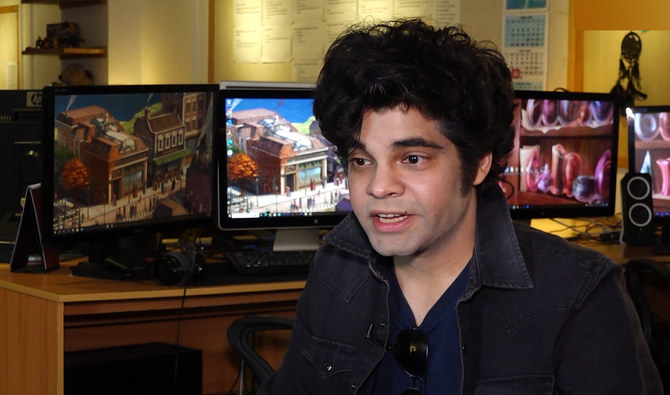KARACHI: Pakistan’s first hand-drawn animated film, “The Glassworker,” is poised to debut nationwide today, Friday, a feature that took its creator Usman Riaz a decade to complete since he first picked up a pencil and started to sketch.
Riaz has hand-drawn and storyboarded each frame of the movie, comprising 1,477 cuts and 2,500 individual drawings, bringing to life the coming-of-age tale of two people from disparate backgrounds: young Vincent who is an apprentice at his father’s glass workshop, and the talented violinist Alliz, the daughter of a military colonel. Around them, a war threatens to upend their lives and the relationships between the children and parents are tested.
“It has been a 10-year obsession to get this done,” Riaz told Arab News in an interview this week, saying the film was the work of creatives from Pakistan, Malaysia, Canada, South Africa, the US and UK.
“The film’s production took four years but the entire journey took 10 years. I was 23 when I started and I am 33 now.
“The first year was just me drawing alone. I would stay up all night sketching my concepts for the characters and on the storyboards. I wanted to do it well and present something to the rest of the world of animation that we can proudly say was made in Pakistan.”
Riaz grew up obsessing over animated films and said he had been drawing ever since he could hold a pencil, spending long hours watching films like Kiki’s Delivery Service, Porco Rosso and Princess Mononoke by famed Japanese animation company Studio Ghibli.
By the time he was 21 in 2012, he was considered something of a whiz at the percussive guitar and was selected that year as a TED Fellow to attend TED Global as a speaker. The TED Fellows program hand-picks young innovators from around the world to raise international awareness of their work and maximize their impact.
The following year, Riaz was selected as a Senior TED Fellow and has since spoken at TED and TEDx conferences in Japan, India, Malaysia, Costa Rica, Turkiye, Canada, the United Kingdom and the United States.
In 2015, as the result of giving a TEDxTokyo talk about his love for Japanese animation, Riaz was extended an invitation to Studio Ghibli where he got to share his work with his heroes and was advised to make something that was truly his own.
After finishing a degree in composition on a full scholarship at the Berklee College of Music in 2017, Riaz returned to Pakistan and co-founded Mano Animation Studios, the country’s first-ever hand-drawn animation facility, with his now wife Mariam Paracha and his cousin Khizer Riaz as its CEO.
“I realized there must be many people like me who loved animation but worked on their own. What if I were to bring some of these artists under one roof?” Riaz wrote in an article for TED in 2016, explaining how Mano Studios came about.
“I searched online for likeminded artists, architects, animators and video game designers, and spread the word by holding workshops in art schools about what I wanted to achieve. I managed to gather a small team of incredibly talented professionals from the UK, South Africa, Malaysia and of course Pakistan.
“I chose the name Mano for the studio because it was my first cat’s name, but I found out later that in Spanish it means “hand” — perfect for a studio that will make animation by hand.”
“COMPELLING STORY”
Riaz said financing to make the film was “extremely difficult” given that Mano was a first-time studio and he was a first-time animation director.
“As much as I have obsessed over the film since I was a child, there was no way to quantify that when I was pitching,” Riaz said, adding that his network and experience at TED helped him obtain funding and get the right people on board.
A total of 250 people worked on “The Glassworker,” including a national and an international cast and crew. Paracha is the art director on the film and Khizer is the producer, alongside Spanish animation veteran Manuel Cristobal of Wrinkles and Bunuel in the Labyrinth of the Turtles. Apoorva Bakshi of Delhi Crime fame is executive producer while international sales are being handled by Charades. The film has been made in both the English and Urdu languages.
“We got to work with David Friedman on the English language version of ‘The Glassworker’ and that was very special because David has worked on a lot of my favorite animated movies. He and his wife, Lynn Friedman, did the casting for the film with us,” Riaz said, speaking about the conductor of the music scores for Disney’s animated features, including Beauty and the Beast, Aladdin, Pocahontas and The Hunchback of Notre Dame.
The voice cast for Riaz’s film includes Art Malik (“Man Like Mobeen”), Sacha Dhawan (“Wolf”), Anjli Mohindra (“The Lazarus Project”) and Tony Jayawardena (“Ackley Bridge”).
“For the Urdu version, I learned everything that I could from David, and I voice-directed it here in Karachi,” Riaz said.
Before the film releases in Pakistan today, “The Glassworker” had its world premiere on June 10 at the Annecy International Animation Festival 2024 in the Contrechamp competition, the first Pakistani film ever to take part in this competition. The film also received rave reviews at the Shanghai International Film Festival 2024.
“Pakistan’s filmmaking tapestry needed something different and I am hoping that this film could be that,” Riaz added.
“Even though ‘The Glassworker’ is an animated film, I hope people resonate with its characters and story. Animation is just the medium we chose to tell this story. We have a compelling story but ultimately the people will decide.”












